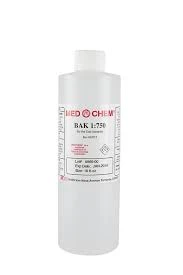scale and corrosion inhibitor for cooling tower
Scale and Corrosion Inhibitors for Cooling Towers An Overview
Cooling towers play a vital role in various industrial operations, particularly in power generation, chemical processing, and HVAC systems. They help discharge waste heat from processes, ensuring optimal operational efficiency. However, cooling towers are prone to scale formation and corrosion, which can significantly diminish their performance and lead to costly repairs. To mitigate these issues, scale and corrosion inhibitors are utilized as essential components of water treatment programs.
Understanding Scale and Corrosion
Scale primarily consists of mineral deposits that form when water evaporates in the cooling process. The most common forms of scale are composed of calcium carbonate, calcium sulfate, and magnesium hydroxide. When these minerals crystallize, they can accumulate on heat exchangers, piping, and other surfaces, leading to reduced heat transfer efficiency and potential system blockages.
Corrosion, on the other hand, is the deterioration of metals caused by chemical reactions with their environment. In cooling towers, corrosion can be exacerbated by factors such as high temperature, oxygen concentration, pH levels, and the presence of aggressive ions like chloride. Corroded equipment can result in leaks, downtime, and increased maintenance costs, ultimately affecting operational efficiency.
The Importance of Inhibitors
To combat scale and corrosion, industries use specific chemical agents known as inhibitors. These inhibitors work by various mechanisms to prevent the formation of scale and protect metals from corrosive attacks. Their use is pivotal not only for maintaining efficiency but also for extending the lifespan of cooling tower components.
1. Scale Inhibitors These are chemicals that interfere with the crystallization process of scale-forming minerals. Common scale inhibitors include phosphonates, polyacrylates, and polyphosphates. They work in several ways - Threshold Inhibition They prevent scale formation at concentrations lower than would otherwise be required. - Crystal Modification They alter the structure of the crystals, making them less adhering and easier to remove. - Dispersion They keep scale particles suspended in the water, preventing them from settling on surfaces.
2. Corrosion Inhibitors Corrosion inhibitors can be classified into anodic, cathodic, and neutral types - Anodic Inhibitors These increase the anodic polarization of metals, which helps delay the oxidation process. - Cathodic Inhibitors They reduce the rate of reduction reactions (such as oxygen reduction), slowing the overall corrosion rate. - Neutral Inhibitors These modify the water chemistry to create a protective film on metal surfaces, shielding them from corrosive agents.
scale and corrosion inhibitor for cooling tower

Application and Effectiveness
The effectiveness of scale and corrosion inhibitors greatly depends on their correct application and monitoring. It is essential to conduct a thorough analysis of the cooling water to determine the types and concentrations of inhibitors required. Factors such as temperature, flow rate, pH, and the presence of suspended solids influence the choice of inhibitors.
Regular monitoring is also crucial. Water chemistry parameters must be routinely checked to detect any changes that could increase the risk of scaling or corrosion. Adjusting the dosage of inhibitors in response to these changes can optimize their performance.
Challenges and Considerations
While inhibitors are effective, their use is not without challenges. For instance, over-dosing can lead to detrimental effects on water quality and aquatic ecosystems upon discharge. Additionally, some inhibitors can contribute to environmental pollution if not handled properly. Hence, industries must choose inhibitors that balance effectiveness with environmental responsibility.
Furthermore, the formulation of inhibitors can vary significantly, and selecting high-quality products from reputable manufacturers is essential to ensure consistent performance. It is also important for facilities to stay updated with advancements in water treatment technologies, which may offer more efficient and eco-friendly solutions.
Conclusion
In summary, scale and corrosion inhibitors are crucial for maintaining the operational efficiency of cooling towers. By preventing scale accumulation and protecting metal components from corrosion, these chemicals help reduce maintenance costs and extend the equipment's lifespan. However, their successful application requires diligent monitoring and a commitment to environmental stewardship. As industries evolve, the development of innovative and sustainable inhibitors will play an integral role in optimizing cooling tower performance while minimizing ecological impacts.
-
Pbtc Scale InhibitorPBTC: A Scale Protector for Industrial Water TreatmentNewsAug.05,2025
-
Organic Phosphonate: An Efficient Defender in the Field of Scale InhibitionNewsAug.05,2025
-
Hydrolyzed Polymaleic Anhydride: Green Pioneer in Scale Inhibition FieldNewsAug.05,2025
-
PAPEMP Polyamino Polyether Methylene Phosphonic Acid For SaleNewsAug.05,2025
-
Flocculant Water Treatment: A Pioneer in Purification in the Field of Water TreatmentNewsAug.05,2025
-
Benzyl Isothiazolinone: An Efficient and Broad-Spectrum Antibacterial Protective GuardNewsAug.05,2025





